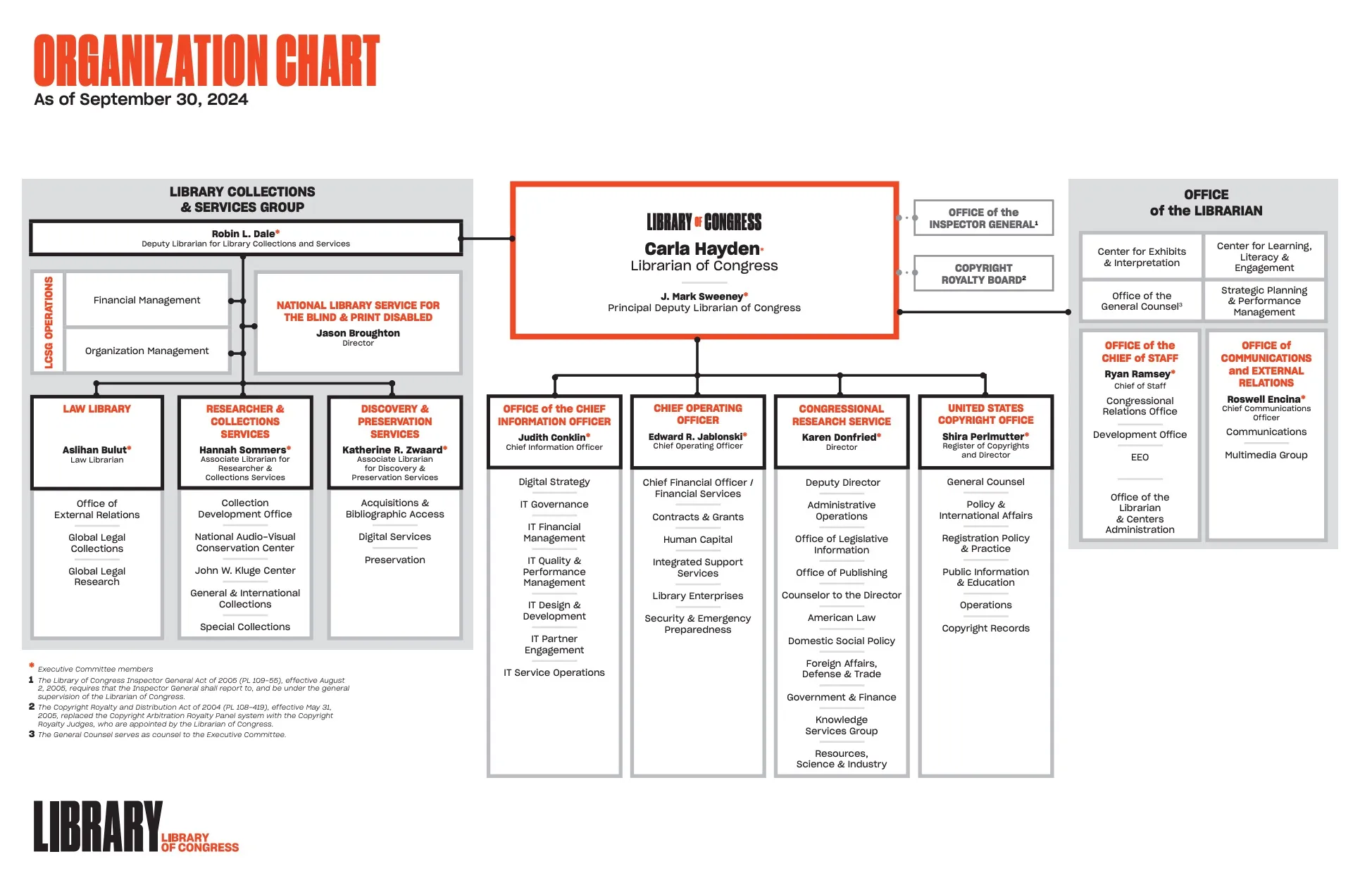Kelly is a former librarian and a long-time blogger at STACKED. She's the editor/author of (DON'T) CALL ME CRAZY: 33 VOICES START THE CONVERSATION ABOUT MENTAL HEALTH and the editor/author of HERE WE ARE: FEMINISM FOR THE REAL WORLD. Her next book, BODY TALK, will publish in Fall 2020. Follow her on Instagram @heykellyjensen.
What Is The Library of Congress?
Founded in 1800, the Library of Congress (LOC) is America’s oldest federal cultural institution. It is the largest library in the world and each week day, the library adds about 10,000 items to its collection. Its mission is “to support the Congress in fulfilling its constitutional duties and to further the progress of knowledge and creativity for the benefit of the American people.”
The LOC, as the name suggests, is an agency of the legislative branch of the US government. Within the LOC are several divisions:
- The Office of the Librarian, responsible for the LOC’s management; sets policy; and oversees programs and activities that further the mission of the LOC
- The Congressional Research Service, which provides nonpartisan confidential and authoritative research and analysis to legislators
- The Copyright Office, which administers US copyright law both for citizens and for federal employees of all three branches of the government
- The Library Collections and Services Group, responsible for acquiring, organizing, preserving, and providing access to collections. There are four divisions within the Library Collections and Services Group, which are Discovery & Preservation Services, the Law Library, the National Library for the Blind and Print Disabled, and Researcher and Collection Services
Literary Activism
News you can use plus tips and tools for the fight against censorship and other bookish activism!
Below is a handy organizational chart that captures the above, as well as additional services and divisions within the LOC.
The Library of Congress is spread across three buildings on Capitol Hill. Its collection contains millions of cataloged books, as well as additional print material in over 470 different languages. The LOC holds the largest rare book collection in North America, as well as the largest collection of legal materials, films, maps, sheet music, and sound recordings in the world. There are also robust LOC digital collections and projects, including the best archived and accessible newspaper collections from across America and its history. Unfortunately, it appears that the National Digital Newspaper Program–the project responsible for building Chronicling America–has been suspended due to grant cuts at the National Endowment for the Humanities, meaning that while the material on site will remain available for the foreseeable future, it will not be added to.
In 2023, the LOC fielded over 681,000 Congressional reference requests, issued over 441,500 copyright registrations, shared more than 24.5 million materials to print disabled and blind patrons (including braille, audio, and large print), and more. The Library of Congress maintains a staff of 3,238 employees and had a total budget of about $875.4 million.
The LOC acquires material in a number of ways. One of the most common is through the copyright deposit. A provision of the copyright law requires that two copies of every copyrighted work published in the US be sent to the Copyright Office, which turns those over to the LOC for cataloging and use. The Library of Congress also gets materials from local, state, and federal government agencies; receives them as gifts; exchanges them with libraries both in the US and abroad; and/or acquires them through purchase.
Anyone age 16 or older can use the Library of Congress without a fee or special permission by acquiring a reader card. But because it is a research library and not a lending library, materials cannot be checked out. Users tend to do special research at the LOC or go to see unique and rare treasures that they may otherwise have never had the opportunity to. Some of the LOC’s materials are available for view without needing to actually register, as those items are on display.
A few more of the things that the Library of Congress offers are programs, including the National Book Festival; access to global cultural documents through the World Digital Library; state-of-the-art preservation of audio and visual materials; and promotion of reading, literacy, and libraries through its Center for the Book.
What Does The Librarian of Congress Do?
The Library of Congress may have gotten its start in 1800, but it would take two more years before an official Office of the Library was established. Thomas Jefferson appointed the first librarian in 1802. By the end of the century though, the power of who could appoint the Librarian of Congress shifted. While the president chooses the Librarian, that Librarian must be approved by Senate.
There have only been 14 Librarians of Congress throughout history. That’s because until 2015, those in the role had no term limits. The “Librarian of Congress Succession Modernization Act of 2015” passed by Congress and President Barack Obama put a 10-year term limit on the role, though Librarians can be reappointed.
The Librarian of Congress needs no qualifications for the role, and most people who’ve held the role have not been librarians nor had a background in librarianship. Several attempts to make the Librarian of Congress role available only to those with the training and education in librarianship have been made through history, but none have succeeded.
Among the responsibilities of the Librarian of Congress include setting the rules and regulations guiding the LOC, accepting and using gifts and money for the needs and interests of the LOC, and ensuring that the Library achieves its mission. The Librarian serves as a liaison between the Library and its institutional purpose and the government. This is not significantly different than a Director role in any other library, though it is at the federal level. It is a nonpartisan, though deeply political, role.
In addition to the duties most commonly associated with library administration, the Librarian of Congress plays a large role in the administration of copyright in the US. The Librarian of Congress oversees the Register of Copyrights and appoints the Register of Copyrights. This role works to advise Congress on copyright matters and oversees the day-to-day operations of copyright. That Trump fired the Register of Copyrights, Shira Perlmutter, just after firing the Librarian of Congress is no coincidence.
The Librarian of Congress also appoints the US Poet Laureate, currently Ada Limón.
Dr. Carla Hayden was the first woman and first Black American to be appointed to the role of Librarian of Congress in 2016. She was also the first Librarian of Congress to have traditional librarian credentials and to have worked a librarian throughout her entire career. Her term would have expired in 2026 and given the state of the administration, would likely not have been continued for another term. But her premature firing came as a surprise, especially as Hayden’s tenure was not only one which showcased significant efforts in modernizing the library but also brought the library to the people. She was active and engaged with citizens across the country and active in promoting the resources available to Americans through the LOC.
Why This Institution and Why Now?
Where the dismantling of the Institute for Museums and Library Services was an opportunity to directly harm public libraries and museums nationwide–libraries, of course, being subject to over four years of attack by right-wing politicians, groups, and citizens–the move to the Library of Congress is even more strategic for this administration. In addition to being able to continue purging historic records related to the history and achievements by people of color, queer people, women, disabled people, or anyone else falling under the broad umbrella of “diversity, equity, and inclusion” (DEI), it’s a prime opportunity to redact, revise, and plunder the record in service of the administration’s America 250 propaganda campaign. This would come as the staff of the Library of Congress saw their numbers deeply slashed, making the workload of the agency impossible to keep up, let alone provide time to push back against directives actively harming the LOC mission. Removing the Librarian of Congress, as well as the Register of Copyrights, meant removing two of the most powerful roadblocks in the way of utter destruction and chaos.
Access to the world of copyright presents an opportunity for this administration to dive even deeper into training artificial intelligence (AI). New laws and regulations on what could or could not be copyrighted are not out of the question, nor is the reality that many of the most important works of American creativity, research, and history be fed to the machines with reckless abandon. What the machine is fed would, of course, be selective and leave out the full scope of history and policy. It’s much easier to create a white American history when you select what documents make the cut (much like it’s easier to get books banned when you cherry pick the passages, rather than read the thing as a whole).
As of writing, Trump has issued several Executive Orders related to AI, including removing barriers to American leadership through AI; pushing American AI dominance; and pushing AI onto young people through the schools–this one, of course, tied directly to the dismantling of the Department of Education and destruction of public schools more broadly. Force the poor kids in public schools to learn how to ask the AI machine how to think; allow the rich kids in private religious schools paid for by public tax money via vouchers to learn how to think within the narrow confines of white supremacy and Christian nationalist ideals.
It is also noteworthy that shoved into the massive Republican budget reconciliation bill at the federal level is a little piece of legislation that would ban any legislation at the state level regulating AI. That 10 year ban would give plenty of time to also allow this administration to see where and how the roles held by those in agencies like the Library of Congress could be outsourced to machines.
More, taking over the Library of Congress would potentially allow access to scores of confidential research requests and resources provided to members of Congress by the library. The possibilities here, as well as the possibilities of what the administration could do with unfettered access to the Law Library are chilling.
Thinking about this administration like a cult is a useful framework for answering many of the whys and why nows. None of these decisions are made out of facts or information, and no amount of arguing about what information they’re sharing about these institutions matters to them or their followers. Facts and information are the enemy, and that’s been clear since Trump laid out his goals for presidency years ago. Press Secretary Karoline Leavitt’s bold-faced lies about Hayden’s dismissal being related to “concerning things that she had done at the Library of Congress in the pursuit of DEI and putting inappropriate books in the library for children” don’t matter because that phrasing and rhetoric is about building a following and loyalty. It’s about social acceptance, not about facts, evidence, expertise, or authority. Libraries and schools are an enemy in such regimes and thus why they become early and easy targets.
What can you do at this point? It’s the same things you’ve been doing all along. But given that the Library of Congress is part of the legislative branch, it is especially crucial to be reaching out to your federal House and Senate representatives and demanding answers, demanding pushback, and demanding accountability. For the first time in a long time, right now we can directly thank Congress for the LOC not yet being ransacked as quickly as the IMLS.
Book Censorship News: May 16, 2025
Things should be mostly back to normal for Literary Activism this week forward. But since we’re catching up on news from late last week for the purposes of the historical record, some of this won’t be new news to readers.
- The US Defense Secretary has, as of writing, lost 5 military aircraft, but he’s spending his time demanding all military institutions remove any DEI books by the end of May.
- Tribal libraries risk losing most of their federal funding, meaning that some of the most crucial libraries in the country (and the patrons who most benefit from libraries) will be left with few options or opportunities for continuing their services.
- We’re seeing cuts to Tribal libraries in Alaska already.
- Sumner County Libraries (TN) already bar anyone under the age of 18 from accessing adult materials in the collection without parental permission. A new policy the board wants to shove through? Letting the board be the deciding factor on all new book purchases. Board members mostly do not have any knowledge or expertise in this professional librarian duty. They do have a vested partisan interest, though!
- A look at the woman who is on a mission to ban all books in public schools in South Carolina by herself . . . and she’s been pretty successful by going directly to the State Department of Education.
- Malinda Lo asks why sex is so scary to book banners.
- The ACLU, on behalf of six families, is trying to get books reinstalled at Department of Defense Education Activity schools. The kids have been pushing back on this banning so hard.
- “Nacogdoches ISD cleared up the misunderstanding In a Facebook post the district says, no books have been removed or banned. Some titles have been placed on the other side of the counter in the high school’s library and now require a parent’s permission.” In this Texas school district, they want it clear they’re not banning books. They’re simply censoring them through restriction. (Revisit: It’s Still Censorship Even If It’s Not Banned). Here’s another piece about the pushback this decision received from the community.
- Columbia County, Georgia, pulled their public library from a regional system which granted access to interlibrary loans across many other libraries. Why? Well, because those other libraries didn’t like that Columbia County banned books. That’s the reason they’re giving, but it’s really that the library board didn’t like that their patrons could likely access those books and bypass their personal ban. More on this story here.
- “Jackson County Commissioners recently discussed leaving the Fontana Regional Library System, citing issues with “left-leaning content” as well as what they call general mismanagement.” A similar story of a library’s board thinking that leaving a library system is the solution to further censoring materials. This time, North Carolina (and I don’t believe this is the first time this system has been threatened this way).
- A New Hanover County, North Carolina, parent tried to get the book Blended by Sharon Draper removed from the district, but the board said it would stay. Now she’s appealing the decision. This district has a history with book banning, and there have been recent protests over it.
- The parent behind the challenge of Blended (see above) is feeling targeted now for filing the challenge. . . she’s a member of the New Hanover School District school board.
- Recall that St. Francis Area Schools District (MN–where there’s an anti-book ban law) made it their policy to select and review items based on the Moms For Liberty slapdash review site BookLooks . . . which is now defunct. Students, parents, and educators continue to fight back against this censorship.
- Libraries in the UK are facing more calls to ban LGBTQ+ books.
- Because the Alabama Public Library Service cannot get Fairhope Public Library to ban books they don’t like, they’re introducing some new rules to outright ban trans materials from public libraries for anyone under the age of 18.
- Read Freely Alabama has a fantastic op-ed about the ways the leader of the Alabama Public Library Service–also president of the state Republican party–is gaslighting citizens across the state.
- The Florida Department of Education sent a letter to Hillsborough County Schools last week claiming they have not removed so-called “pornographic and inappropriate books” from some of the high schools. This is over two books, and it’s important to note it’s in direct contradiction to the state’s own previous assertions that enforcement is up to the local districts and not the state.
- The Texas House has advanced a book banning bill in public libraries. Remember: there is no obscene nor pornographic material in libraries.
- “Some books in Alamance County libraries [NC] may be marked with a bright, yellow sticker in the near future as the Alamance County Commissioners approved a content warning labeling policy.” The way this works is any bigot can complain about a book and say it needs a label, then “high-ranking staff members” will make a final decision. This is a massive liability and flies in the face of public librarianship ethics and best practices.
- Remember Patmos Library in Michigan, where the library was defunded by a small number of voters shilling “groomer” rhetoric over a few LGBTQ+ books? Where the funding was then returned? The library is currently closed for the immediate future, as the board elected into office in November has been so oppressive that FIVE staff members quit.
- A man burns 100 Beachwood Public Library (OH) books on Jewish, African American, LGBTQ+ education. Don’t be fooled–this kind of behavior will increase during Pride.
- In good news following the above story, the community stepped up with donations.
- This story is paywalled, but there’s enough information here to share: Delaware is one step closer to passing an anti-book ban bill.
- Likewise, the Rhode Island Senate just passed their anti-book ban bill, bringing it one step closer to law.
- Spanish Fort Public Library (AL) is creating new restrictions to material in the public library. This story is paywalled and as of writing, the only other outlet covering it is a far-right one in the state.
- “The proposal would streamline the process of pulling books from shelves. Under the proposed policy, if a book is determined to be “obscene,” it would be removed within three days and be subject to a school board hearing.” This is a proposed policy in Redlands Schools (CA). Remember, California has an anti-book ban policy, but that’s only as good as its enforcement. This policy would undermine the entire thing.
- Anderson County Libraries (SC) have delayed voting on a new collection policy that would make banning books in the public library district easier.
- Due to IMLS cuts and funding cuts at the state level, 50 Washington State Library workers will be losing their jobs. This particular series of cuts would devastate access to materials for the blind and print disabled across the state.
- Now that one of the biggest transphobes and book banners is no longer on the Katy Independent School District (TX) school board, community members are asking for a return of books and overturning of anti-trans policies.
- The school librarian at Lowell Area Schools (MI) is suing one of the folks who has been harassing her and calling her a variety of names for, you know, being a librarian in this era. You can help by donating to offset the costs of the lawsuit here, if you’re interested.
- Rockingham County School Board (VA) just banned Perfect by Ellen Hopkins and Tweak by Nic Sheff. These books are old, y’all.
- Horry County Libraries (SC) are reclassifying books to meet the provisions of the state law passed last year. In other words, censorship by relocation going on here.
- In what’s some pretty big news, the anti-drag law passed in Florida is likely unconstitutional, per federal court. It’ll be interesting to see what the ramifications are for this ruling in other states that have banned drag.
- I Am Billie Jean King has been banned from Lexington-Richmond 5 school libraries (SC) because there is a depiction of a same-sex relationship.
- “The Pine Richland Education Association, along with the Pennsylvania State Education Association, issued a vote of no confidence in the majority of the district’s board of directors.” This is the Pennsylvania school district board creating book banning policy rather than tackling actual issues.
- A small contingent of Collier County, Florida, parents are mad about a biology textbook approved for the district that talks about, well, science.
- This story is paywalled, but republicans trying to push new restrictions on materials–especially LGBTQ+ ones–in Kent Memorial Library (CT) have dropped their plans. I know they want to be heralded as champions and reasonable now, but it was a waste of time and energy from the get go.
- Moms For Liberty in Guilford County, North Carolina, have lodged a complaint in Summerfield Elementary School over And Tango Makes Three. They claim that the book is against North Carolina state law.




















 English (US) ·
English (US) ·